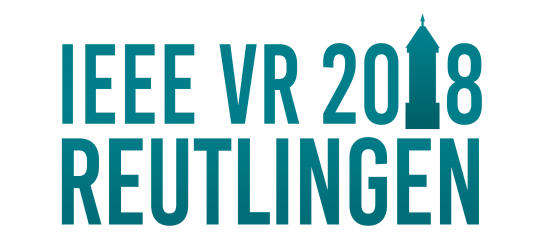IEEE VR 2018
Primary tabs

Special Event: IEEE VR 2018 Tutorial, Web3D Quickstart |
||
|
||
Since 1993, the IEEE Virtual Reality conference has been the premier international venue for the presentation of research results in the broad area of virtual reality (VR). Similarly, the IEEE Symposium on 3D User Interfaces (3DUI), which started as a workshop at IEEE VR in 2004, has become the premier venue for 3D user interfaces and 3D interaction in VR environments.
Due to exploding worldwide interests and tremendous synergy of the fields, VR and 3DUI have been merged into a single IEEE Conference on Virtual Reality and 3D User Interfaces, with the short name IEEE VR.
In contrast to previous years there will not be a separate 3DUI event. Instead IEEE VR will encompass all of the great work in the areas of VR, AR, and 3DUIs in parallel sessions. The conference is expected to feature a very full program of research paper presentations and posters, as well as panels, workshops, tutorials, and keynotes.
Furthermore, the submission categories have changed. IEEE VR 2018 features two categories of submissions: (i) VR Journal Papers, and (ii) VR Conference Papers. Both categories have their own program committees, submission processes, and review processes.
IEEE VR 2018 seeks contributions including, but not limited to, the following topics:
- Tracking and sensing
- Input devices for VR/AR/MR
- Advanced display technology
- Immersive projection technology
- Haptics, audio, and other non-visual interfaces
- Modeling and simulation
- Computer graphics techniques for VR/AR/MR
- Virtual humans and avatars
- Multi-user and distributed VR/AR/MR
- VR systems and toolkits
- Locomotion and navigation in virtual environments
- User studies and evaluation
- Perception, presence, virtual embodiment, and cognition
- Teleoperation and telepresence
- Applications of VR/AR/MR
- Ethical issues in VR/AR/MR
- Interactive storytelling in 360° videos
- 3D interaction for VR/AR/MR
- 3DUI metaphors for VR/AR/MR
- Mobile, Desktop or Hybrid 3DUIs
- Non-fatiguing 3DUIs
- Evaluation methods for 3DUIs
- Empirical studies of 3DUIs
- Applications of 3DUIs: Games, entertainment, CAD, education, etc.






